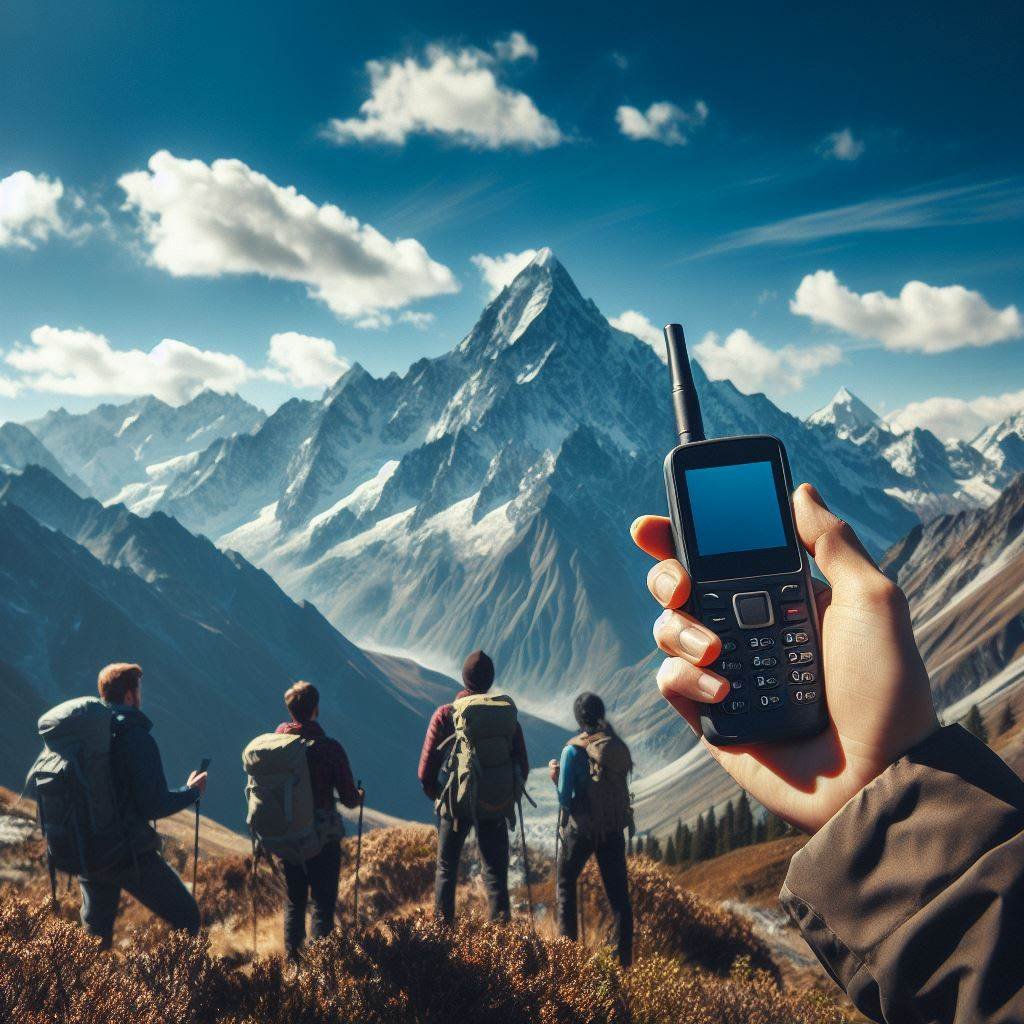Table of Contents
Always Connected: Why Satellite Phones Are Making a Comeback
In a world increasingly reliant on constant connectivity, satellite phones are emerging from their niche market status. Once seen as bulky tools for emergencies or remote professions, satellite phones are becoming slimmer, more affordable, and packed with features.
This resurgence is driven by a growing desire to stay connected everywhere, from adventurers seeking off-the-grid experiences to professionals working in far-flung locations.
Let’s explore the reasons why satellite phones are shedding their old image and becoming the new must-have for global communication.

How Much Does It Cost to Have a Satellite Phone?
The cost of owning a satellite phone can vary significantly depending on several factors, including the specific model, service plan, and usage requirements. Here’s a breakdown of some typical costs:
1. Satellite Phone Hardware: The initial purchase price for a satellite phone can range from $500 to $1,500 or more, depending on the manufacturer and features.
2. Activation and Setup Fees: Most providers charge an activation fee, typically ranging from $20 to $100.
3. Airtime and Service Plans: Monthly plans can range from $30 to $100 or more for basic voice and data services, with additional fees for overage charges or international roaming.
4. Additional Accessories: Extra batteries, car kits, or solar chargers can add to the overall cost.
Choosing the Best Satellite Phone: It Depends on Your Needs
With so many options on the market, selecting the right satellite phone depends on your priorities. Here’s a quick breakdown to get you started:
-
Durability & Battery Life: For adventurers, prioritize a rugged phone with a long battery life, like the Iridium 9555.
-
Budget: Value-conscious users might consider the Inmarsat IsatPhone 2, known for its affordability and reliable calling.
-
Global Coverage: If worldwide connectivity is essential, the Iridium network offers the most comprehensive service, with phones like the Iridium 9575 Extreme.
-
Messengers vs Phones: For basic texting and emergency SOS features, a satellite messenger like the Garmin inReach Mini 2 might be sufficient.
Can a Civilian Buy a Satellite Phone?
Yes, satellite phones are available for purchase by civilians, and their use is not restricted to military or government agencies. Many providers cater to both consumer and commercial markets, offering solutions for individuals, families, adventurers, and businesses operating in remote areas or emergency situations.
Are Satellite Phones Legal in the US?
In the United States, satellite phones are legal for civilian use, but there are certain regulations and restrictions in place:
- FCC Regulations: Satellite phone models must be approved and certified by the Federal Communications Commission (FCC) before they can be legally used within the country.
- Frequency Bands: Users must ensure they are using approved frequencies and adhere to any applicable rules and limitations.
- Encryption Limitations: Some models may have encryption capabilities subject to export control regulations or restrictions on the use of certain algorithms within the US.
- Emergency Services: While satellite phones can be used for emergency calls, they may not always connect to local emergency services like 911 due to their global coverage.
What Is the Downside to a Satellite Phone?
While offering unique advantages, satellite phones also have some potential downsides:
1. Limited Coverage: Despite their global reach, satellite phones may experience coverage gaps or degraded service in certain areas with obstructions that block the line of sight to the satellites.
2. Battery Life: Satellite phones generally have shorter battery life compared to traditional cellular phones due to the power required for satellite communications.
3. Signal Acquisition Time: Establishing a connection with the satellite network can take slightly longer than with terrestrial cellular networks.
4. Cost: Satellite phone hardware, service plans, and usage fees can be significantly more expensive than traditional cellular services.
5. Bulkier Design: Satellite phones tend to be larger and heavier than modern smartphones due to the additional components required for satellite communications.
6. Limited Data Speeds: While satellite phones can provide data connectivity, their data speeds are generally slower compared to modern cellular or broadband networks.

Buying Guide: Satellite Phones
When considering the purchase of a satellite phone, there are several factors to keep in mind to ensure you select the right device for your needs.
Size: Satellite phones are generally larger and bulkier than traditional smartphones, but there is still some variation in size among different models. Consider the portability and ease of carrying the device, especially if you plan to use it in outdoor or remote environments.
Battery Life: Battery life is a critical consideration for satellite phones, as they require more power to communicate with satellites in orbit. Most satellite phone batteries offer 3-8 hours of talk time and 24-36 hours of standby time. It’s essential to carry spare batteries or a solar charger for extended trips or emergency situations.
Security: Satellite phones offer various security features to protect your communications and data, such as encryption technologies, user authentication, secure messaging, and remote locking or wiping capabilities. However, the level of security can vary depending on the specific model and service provider.
Brands: Some of the most prominent satellite phone brands include Iridium, Inmarsat, Globalstar, and Thuraya. The best brand for you will depend on factors like coverage area, features, pricing, and your specific communication needs.
Who Is the Largest Satellite Phone Provider?
Iridium is widely considered the largest and most prominent satellite phone provider, offering global coverage through its constellation of 66 low-Earth orbit satellites. Other major players in the market include Inmarsat, Globalstar, and Thuraya.
How Long Does a Satellite Phone Battery Last?
Most satellite phone batteries are designed to provide several hours of talk time, but actual battery life can vary. As a general guideline, many satellite phone batteries offer decent life.
The battery life of a satellite phone depends on the model and its specifications, as well as how it’s used.
- LEO-powered satellite phone: A high capacity battery can last up to 30 hours on standby and 3.2 hours of talk time
- SatelliteMobilePhones.com: A battery can last up to 3.5 hours of talk time, 19 hours on standby, or up to a week if the phone is turned on intermittently
- Thuraya XT LITE: Up to 6 hours of talk time and 80 hours on standby
- Thuraya XT PRO: Up to 9 hours of talk time and 100 hours on standby
- Thuraya SatSleeve: Up to 3 hours of talk time and 70 hours on standby with Wi-Fi off
- Iridium 9555: Up to 4 hours of talk time and 30 hours on standby
- InReach Mini 2: Up to 14 days on default 10-minute tracking mode
- IsatPhone Pro: Up to 8 hours of talk time
It’s essential to carry spare batteries or a solar charger, especially for extended trips or emergency situations where power sources may be limited.

Satellite Phone FAQ: Your Guide to Staying Connected Anywhere
Q: Are satellite phones truly global?
A: Absolutely! Unlike cell phones that rely on land towers, satellite phones connect directly to orbiting satellites, providing coverage virtually anywhere on Earth – from mountaintops to deserts, and even at sea.
Q: I don’t need fancy data, just calls and texts. Can a satellite phone handle that?
A: Yes! While some satellite phones offer data plans, the core functionality excels at reliable voice calls and SMS messaging, perfect for staying in touch in remote areas.
Q: Do I need a special permit to use a satellite phone?
A: Regulations can vary by country. It’s always best to check with the local authorities or your satellite phone provider before traveling to ensure you’re compliant.
Q: Won’t a satellite phone be too bulky and heavy?
A: Modern satellite phones are surprisingly compact and lightweight. Many are designed for portability and ruggedness, making them ideal companions for outdoor adventures.
Q: Sounds expensive! How much does using a satellite phone cost?
A: The cost can vary depending on the provider and plan you choose. However, packages with pay-as-you-go options or limited minute bundles are available to fit different needs.
Q: Help! I’m outside with my satellite phone, but there’s no signal. What gives?
A: For the best connection, you’ll need a clear view of the sky. Buildings, mountains, or dense foliage can block the signal. Try finding an open area and holding the phone with the antenna pointed upwards.

How Secure Is a Satellite Phone?
Satellite phones offer various security features to protect your communications and data. Most satellite phone networks employ encryption technologies to secure voice and data transmissions, making it difficult for unauthorized parties to intercept or eavesdrop on conversations.
Additionally, some satellite phones may offer additional security features like user authentication, secure messaging, and remote locking or wiping capabilities.
While satellite phone communications are generally more secure than traditional cellular networks, they are not immune to potential vulnerabilities or sophisticated cyber threats.
Proper security practices, like using strong passwords and keeping software updated, are still recommended.
Whether you’re an adventurer exploring remote regions, a professional working in areas with limited infrastructure, or someone seeking reliable communication during emergencies, satellite phones offer a valuable solution.
With their global reach, ruggedized design, and advanced security features, these portable communication devices can keep you connected when traditional mobile networks fail, ensuring you stay in touch no matter where your journey takes you.
Gear Up for Adventure: Sat Phone Resources
- The best Satellite Phones in the World 🌎 via Outdoor Tech Lab
- 3 Best Satellite Communicators under $400
- BlueCosmo Satellite Phone Store

Introducing JC – The Outdoor Gear Enthusiast and Tester behind Outdoor Tech Lab:
Dive into the exciting world of outdoor gear technology with JC, the founder and driving force behind Outdoor Tech Lab.
With a passion for backpacking, nature and a knack for outdoor gadgets, JC has embarked on a mission to help others explore the outdoors in smarter, safer, and more enjoyable ways.
Join us on the adventure as we explore the ever-evolving landscape of outdoor gear & technology.
Through insightful reviews, practical tips, testing and engaging stories, Outdoor Tech Lab is your one-stop shop for navigating the wild world of outdoor gadgets and gear in 2025 and beyond.




Leave a Reply